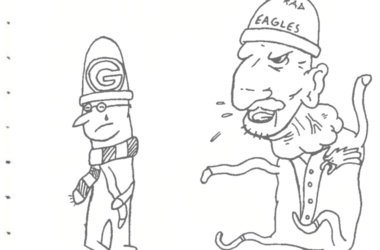Soccer, football, the beautiful game; whatever you want to call it, it’s a sport suffering from a debilitating illness. One symptom of this illness is players flying through the air whenever they are so much as grazed by an opposing player in a pathetic, yet all too often fruitful, attempt to draw the referee’s attention. I call it…dive-arosis.
Most recently the disease transformed this summer’s World Cup from what should have been a beautiful and entertaining event into an at times almost laughable display of acting and poor sportsmanship.
In all, the 2006 World Cup produced 345 yellow and 28 red cards, smashing the previous records. It should also be noted that both those previous records were also set in the diving era which has taken off in the last decade.
In that short time, diving has already changed the game. A significant portion of soccer’s appeal is based on flow. At its best, it is a game of continuous and suspenseful action. But increasingly it has become a slow and choppy affair, punctuated by a surplus of stops and starts.
Brazil, the most successful nation in the history of world soccer, has always built their game around a slow building attack based on short passes and continuous movement of players off the ball. Not surprisingly, this is why they are one of the teams least likely to be seen diving. When a foul is committed against the Brazilians it is not uncommon to see them simply put the ball back in play rather then kill their momentum by preparing a set piece.
This is also the reason they are the only remaining team who is consistently entertaining to watch. Most teams at this past World Cup relied on long ball tactics or brisk runs up the wings in hopes of being able to set up a free kick from a dangerous area or a penalty shot. One need look no further then the champion Italians. The Azzuri continually played as many as ten players behind the ball while only creating offence by drawing penalty shots (see win over Australia) and set pieces (see win over France).
So what’s to be done? How do we cure the beautiful game from its malady? FIFA is currently looking into possible rule changes such as bringing on a second referee or allowing for 3 yellow cards before a red is produced. But this sounds like reasoning so foolish it would make the NHL’s competition committee proud.
Instead I propose a simple solution: exorbitant punishment. If a player is found guilty of diving, assess him with a minimum three match suspension. If the referee initially misses it, review the call after the fact and punish the offender accordingly. Essentially, give the diver a penalty that would surely make a player think twice before diving; in a tournament like the World Cup, three matches is an eternity.
In addition, each team should be allowed two video challenges per game-Ã la NFL-so that the referee may review the play and decide if his initial decision was appropriate. If a player is guilty of diving he would receive an automatic yellow card plus the aforementioned three match suspension.
It’s tough, but quite frankly, it’s necessary. We can not let the beautiful game die on the operating table. Desperate times call for desperate measures, and anyone who saw the round-of-sixteen match between Portugal and the Netherlands in which twenty cards were issued, will tell you that the times, they are a desperate.









